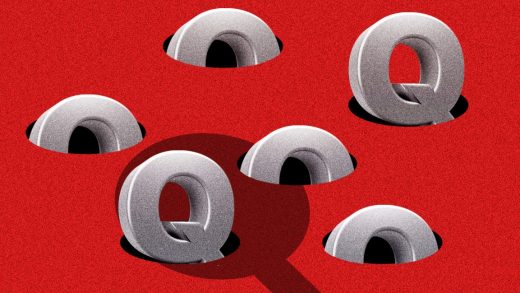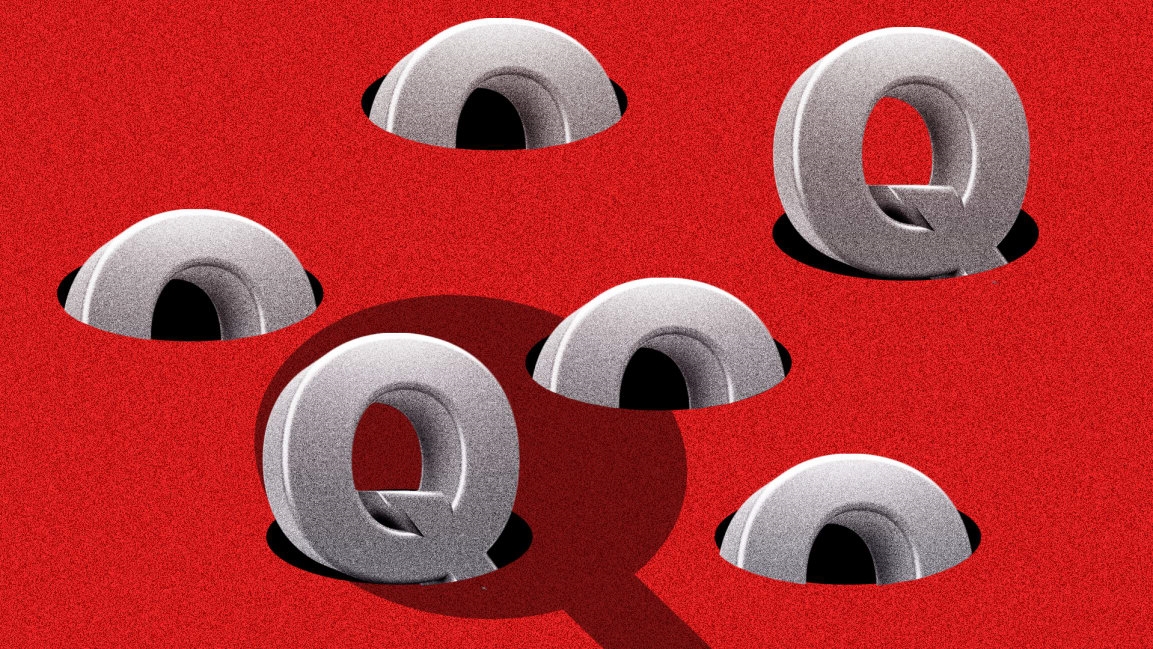Influential QAnon accounts are still active on Twitter, despite a sweeping ban
At a time when the spread of misinformation can literally have life-or-death consequences, the danger of conspiracy theories is difficult to overstate. Just days after President Trump said “it would be interesting to check” if injecting disinfectants can prevent the coronavirus from doing a “tremendous number on the lungs,” health officials reported a steep increase in people drinking cleaning solutions.
But the spread of such false theories on Twitter, Facebook, and other social media sites has been a perennial challenge for the platforms, often leading to whack-a-mole scenarios in which toxic content continues to proliferate. And one particularly menacing conspiracy theory that’s proven difficult to scrub is QAnon.
Despite Twitter’s widely praised decision last week to permanently suspend accounts that share QAnon conspiracy theories (it removed 7,000 accounts and hid an additional 150,000 from trends and searches), some influential QAnon accounts are still active on the platform. As of Monday afternoon, those included widely followed accounts responsible for starting or spreading some of the most insidious QAnon-related conspiracies, including a theory that accuses billionaire George Soros of funding the Black Lives Matter protests and antifa movement; a theory claiming that Soros funded a laboratory in Wuhan, China (where the coronavirus was first discovered); and one that claims storage cabinets used by online retailer Wayfair are used to traffic children.
Some of the active Twitter accounts have followers numbering in the tens of thousands. They were first discovered by a private investigation firm and shared with Fast Company on the condition of anonymity because the research was done for a private client.
Of the nine QAnon accounts that started or popularized the aforementioned conspiracy theories, only one—@educati0n4libs—has been suspended by Twitter. The other eight accounts—@mikebravodude, @TruthHammer888, @Autumtear1, @We_R_an0nym0us, @SPF2Million, @DLAustin5, @KAG2020_Q17, and @VictoriaKropf—were all still active as of Monday.
In fact, most of the QAnon-related accounts that first spread the conspiracy theory about the funding of the Wuhan laboratory back on January 23 are still active, though some have been hidden from trends and searches.
After being contacted by Fast Company about the active accounts, a Twitter spokesperson said some of the accounts have since been permanently suspended.
Extremism pipeline
QAnon refers to a series of conspiracy theories that emerged in the wake of Trump’s election in 2016, centering on the claim that a lone security official named Q was revealing details about a secret “deep state” plot to undermine Trump. Some of the theory’s most hardcore adherents have committed violence, including the murder of a mobster in New York who was shot 10 times outside his home in March 2019, the arrest of a man who drove an armored truck with an AR-15 and a handgun to the Hoover Dam, and the arrest of a woman who had been live-streaming her effort to “take out” Democratic presidential candidate Joe Biden.
Extremists associated with the conspiracy have been deemed a domestic terrorism threat by the FBI, according to a memo from the bureau’s Phoenix field office in early 2019. “The FBI assesses these conspiracy theories very likely will emerge, spread, and evolve in the modern information marketplace, occasionally driving both groups and individual extremists to carry out criminal or violent acts,” the memo read.
QAnon theories, which first emerged in October 2017 with some anonymous postings on 4chan, have attracted an increasing number of followers, including at least a dozen current candidates for Congress who have expressed support for QAnon. The emergence of the coronavirus has spawned new branches of the theory—making false claims about the origin of COVID-19 and its health effects—and ascribing a dark role to certain public figures, such as Soros and Hillary Clinton, who have long been targeted by far-right activists.
Twitter acting against the networked faction of QAnon is a significant change to how it has traditionally applied its policies.”
Joan Donovan, Shorenstein Center
In Twitter’s announcement last week, the company stated that its permanent suspension would apply to accounts tweeting about QAnon that engage in “violations of our multi-account policy, coordinating abuse around individual victims, or are attempting to evade a previous suspension.” Yet one QAnon-related account that remains active, with over 255,600 followers, is @VenezuelaAnons, which began a coordinated effort against Soros on Twitter, prompting #sorosesterrorismo, a Spanish-language hashtag alleging that Soros is a terrorist, to go viral.
Last week’s crackdown by Twitter was heralded as a long-overdue step by the platform, though its effectiveness remains in doubt.
“Twitter acting against the networked faction of QAnon is a significant change to how it has traditionally applied its policies,” says Joan Donovan, research director of the Shorenstein Center on Media and Public Policy, who also notes how K-pop adherents recently manipulated the platform to undermine President Trump’s rally in Tulsa, Oklahoma. “I think the battle between QAnon and K-pop shows Twitter how these groups can coordinate to manipulate their algorithms for good and bad purposes. Particularly, when it is used to push medical misinformation, we see it cause serious rifts in public discourse.”
A global problem
Experts say Twitter’s crackdown on QAnon could also backfire, further feeding the paranoia of conspiracists and attracting even more followers. QAnon supporters have tried to evade detection on social media platforms with subtle tweaks, like adopting the number 17 (since Q is the 17th letter of the alphabet) and using “CueAnon” instead of QAnon. And as Rolling Stone reported last week, conspiracy mongers are fleeing Twitter for smaller platforms that give them more latitude to spread their theories, such as Parler, Telegram, Voat, and even TikTok.
Melanie Smith, head of analysis at social analytics firm Graphika, has been tracking the growth of the QAnon community and its evolution across social media platforms for the past two years. She says the problem is now a global one, with multifaceted factions seeing huge organic growth. Even countries such as Brazil and Japan are now home to dedicated QAnon communities, she says.
“QAnon accounts have proven resilient to previous efforts by platforms to curb some of the most problematic content it often shares,” Smith says. “There are difficulties in taking action against the QAnon community; Twitter accounts are rarely created for the sole purpose of supporting the movement and are usually engaged in promoting a much broader set of political beliefs, and the community is spread throughout a large network of channels across social media platforms. In this context, Twitter’s actions are unlikely to have a significant impact on the overall community.”
(35)



